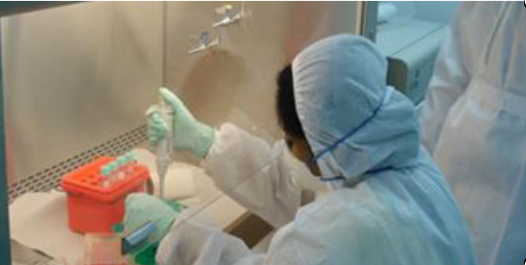GCC Biotech is manufacturing the kits on a public-private partnership (PPP) model

The Indian Council of Medical Research (ICMR), in Dibrugarh, Assam has designed a kit that can detect the Omicron variant in two hours.
A team of scientists of Regional Medical Research Centre (RMRC ) for the Northeast region, ICMR has developed a testing kit that enables to detect the Omicron variant of Covid-19 in real time.
With India reporting five more Omicron cases on December 12th 2021, the total number of cases has now crossed 38. In the UK, the cases are spreading fast and on Sunday raised its Covid alert level due to the rapid increase in cases. The total number of Omicron cases in the UK stood at 3,137, a 65 per cent increase from Saturday’s total of 1898.
The team led by scientist Dr Biswajyoti Borkakoty has prepared a kit that has the ability to detect the Omicron variant in 2 hour time from a given sample.
"ICMR-RMRC, Dibrugarh, has designed and developed a hydrolysis probe-based real-time RT-PCR assay for detection of the new Omicron variant (B.1.1.529) SARS-CoV-2 (COVID-19) that can detect the new variant within 2 hours. This is important because as of now a minimum of 36 hours is required for targeted sequencing and 4 to 5 days for whole-genome sequencing to detect the variant,” said Dr Borkakoty on Saturday.
The kit is now being produced in large numbers by a Kolkata-based company, GCC biotech on a public-private partnership (PPP) model.
"The kit has been tested against specific synthetic gene fragments of Omicron variant of SARS-CoV-2 within two different highly specific unique regions of the spike protein and also reference wild type control synthetic gene fragments. Internal validation has shown that the tests are 100 per cent accurate,” said Dr Borkakoty.
It may be mentioned that in July 2020, a team of scientists led by Dr. Borkakoty had successfully managed to isolate the COVID-19 virus (SARS-CoV-2) and by doing so ICMR-RMRC Dibrugarh became the third government laboratory in the country to achieve the feat.
According to the World Health Organisation, based on current limited evidence Omicron appears to have a growth advantage over Delta. It is spreading faster than the Delta variant in South Africa where Delta circulation was low, but also appears to spread more quickly than the Delta variant in other countries where the incidence of Delta is high, such as in the United Kingdom. Whether Omicron’s observed rapid growth rate in countries with high levels of population immunity is related to immune evasion, intrinsic increased transmissibility, or a combination of both remains uncertain. However, given the current available data, it is likely that Omicron will outpace the Delta variant where community transmission occurs. There are still limited data on the clinical severity of Omicron. While preliminary findings from South Africa suggest it may be less severe than Delta, and all cases reported in the EU/EEA to date have been mild or asymptomatic, it remains unclear to what extent Omicron may be inherently less virulent. More data are needed to understand the severity profile.

Subscribe To Our Newsletter & Stay Updated